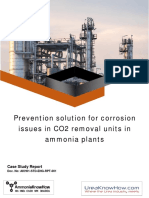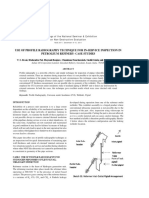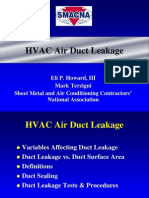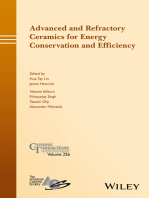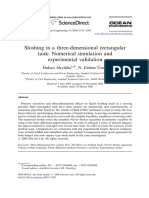Strong Acid System Troubleshooting: - Stick Test
Strong Acid System Troubleshooting: - Stick Test
Uploaded by
rsubramaniCopyright:
Available Formats
Strong Acid System Troubleshooting: - Stick Test
Strong Acid System Troubleshooting: - Stick Test
Uploaded by
rsubramaniOriginal Title
Copyright
Available Formats
Share this document
Did you find this document useful?
Is this content inappropriate?
Copyright:
Available Formats
Strong Acid System Troubleshooting: - Stick Test
Strong Acid System Troubleshooting: - Stick Test
Uploaded by
rsubramaniCopyright:
Available Formats
11/18/21, 3:23 PM Stick Test
Sulphuric Acid on the WebTM Technical
Manual DKL Engineering, Inc.
Knowledge for the Strong Acid System - Troubleshooting
- Stick Test
Sulphuric Acid May 23, 2014
Industry
Introduction
A stick test is a qualitative test used to troubleshoot the operation of a dry or absorber tower and its
Sulphuric Acid on the mist eliminators. The test basically consists of inserting a wooden stick in the gas flow exiting the
Web tower. Any acid particles impacting the stick will leave a dark spot on the surface of the wood. The
quantity and size of the spots will provide an indication of the tower and mist eliminator performance.
Introduction
General A large number of small spots (< 5 mm diameter) on the stick will indicate problems with the mist
Equipment Suppliers
eliminator, typically re-entrainment of acid.
Contractor
Instrumentation
Industry News A uniform darkening of a dry stick will indicate the presence of high SO3
concentrations. The
Maintenance moisture present in the wood reacts with the unabsorbed SO3 from the absorber tower causing the
Acid
Traders
uniform darkening.
Organizations
Fabricators
Conferences A stick test that results in a heavily spotted or black wet stick indicates a case of severe gas
Used
Plants bypassing, mist eliminator flooding, high inlet loadings, etc. These problems are serious and should
Intellectual
Propoerty be addressed immediately before long-term damage to downstream equipment occurs.
Acid
Plant Database
Market
Information
Library
Ideally, a stick test should be performed far enough downstream from the tower in a straight
horizontal section of stainless steel duct. The stick should be inserted vertically in the gas stream.
Stick tests performed too near the tower exit can be affected by the turbulent flow conditions of the
Technical Manual gas as it exits the tower. The presence of an elbow at the tower exit can further complicate the test
results.
Introduction
General
Definitions Acid condensing on the walls of the duct can affect the stick test if this acid is re-entrained into the
Instrumentation gas stream. Sulphate formation on the inside walls of a carbon steel duct can also affect the stick
Plant Safety test.
Metallurgial
Processes
Metallurgical
This procedure is general in nature and as such should be adapted to the specific conditions and
Sulphur Burning
Acid Regeneration
procedures existing at the site at the time the operation is performed.
Lead Chamber
Technology
Gas Cleaning
Contact
Strong Acid
Acid Storage
Loading/Unloading
Transportation
Sulphur
Systems Safety
Liquid SO2
Boiler Feed Water Personnel shall wear as a minimum SO2 respirators, protective goggles, face shield, clothing and
Steam Systems
Cooling Water
gloves. Stick tests performed on towers where the tower is operating under pressure will be
Effluent Treatment hazardous due to the process gas (containing SO2, SO3/Acid mist) that will escape when the valve is
Utilities open.
Construction
Maintenance
The location of stick test valve is often high up where access may be difficult. Ensure that suitable
Inspection
Analytical Procedures
access is provided (either permanent or temporary). Safety harnesses may be required if a falling
Materials of Construction hazard is present.
Corrosion
Properties Equipment and Supplies
Vendor Data
The following equipment will be required:
DKL Engineering, Inc.
1"x1" square light coloured wood sticks (typically pine) long enough to span across the entire
Handbook of Sulphuric Acid
Manufacturing duct.
Order
Form Some form of stopper or plug to minimize the flow of gas out of the valve.
Preface
Contents
Stopwatch or timer
Feedback
A full bore valve (minimum 2" diameter) is required in the tower outlet duct. Safe access to the valve
Sulphuric Acid Decolourization is also required. A ball valve is recommended since it can be opened and shut quickly.
Order Form
Preface Procedure
Table of Contents
1. Decide on the length of time to perform the stick test. A 2 to 3 minute test is typical.
Process Engineering Data
Sheets - PEDS 2. Ensure that all safety equipment is being worn.
Order Form
Table of Contents 3. Quickly open the stick test valve. Stand off to the side of the valve to avoid being hit by any
Introduction liquid, sulphate, etc. that may be in the valve.
Bibliography of Sulphuric Acid 4. Immediately insert the stick so that it spans across the entire duct. Ensure that the stopper or
Technology plug is in place to minimize the gas that exits through the valve. The stick will need to be held
Order Form in place to prevent it from moving.
Preface
Contents 5. When the allotted time is reached, quickly remove the stick and close the valve.
6. Immediately examine the stick and record the observations.
Sulphuric Acid Plant
Specifications 7. Perform additional stick tests as required based on the results of previous tests. The insertion
time can be varied based on previous results.
The following operating conditions should be noted whenever a stick test is performed:
Google Search
www.sulphuric-acid.com/techmanual/strong acid/sa_ts_stick_test.htm 1/3
11/18/21, 3:23 PM Stick Test
Gas flow or plant capacity
Acid conditions in the tower (temperature, concentration, flow)
Gas temperature exit the tower
Mist eliminator pressure drop
Any visual observations at the time of the test (stack appearance, view through tower sight
glasses)
After many tests are performed, a 'database' of sticks will be available for each tower representing
various operating conditions and problems. Typical sticks should be retained for future comparisons.
Stick Test Device
Performing stick tests on towers that are operating under pressure can be hazardous due to the gas
that escapes from the open valve. Some operators attempt to reduce the flow gas by stuffing pieces
of cloth around the stick. A simple device constructed of rubber gaskets can greatly improve the
safety of performing stick tests. An opening the shape and size of the stick is cut into the centre of
the gasket. The opening is slightly smaller than the dimensions of the stick. Two or three gaskets are
used to ensure a good seal around the stick. The gaskets are mounted on the stick test valve using a
standard flange.
Stick Test Device - Rubber gaskets and CPVC
mounting flange
Stick test valve
Stick test device mounted on valve
Stick test valve and device with stick inserted
A test of the device indicated a large reduction in the amount of gas leaking out of the open valve
providing for improve operator safety.
Video
Hanging Candle Stick Test
When a stick test reveals that there is carry over of acid droplets it is difficult to determine which candle
is causing the problems. Sight glasses in the tower give a limited field of vision and are often dirty to the
point where nothing can be seen inside the tower. Even during an internal inspection of the tower it is
sometimes difficult to locate the problem.
A stick test can be performed inside the tower by placing sticks across the top of candles in the standing
position. The plant blower is operated for a short time blowing air through the plant. When the sticks
are examined it may be possible to determine which candle is bypassing and even if a gasket is leaking.
The following picture shows acid droplets that have impacted on a stick. The pattern clearly shows that
acid was being sprayed by a gasket leak from an adjacent candle.
www.sulphuric-acid.com/techmanual/strong acid/sa_ts_stick_test.htm 2/3
11/18/21, 3:23 PM Stick Test
This picture shows acid droplets that have impinged on a stick place over the outlet of the candle.
Copyright© 2005-2018 DKL Engineering, Inc., All Rights Reserved
DKL Engineering, Inc. shall not be held liable for any type of
damages resulting from the use of this information. The user assumes all risk and
liability in connection with the use of information contained in this and associated web
sites. The data is intended for
personal, non-commercial use.
www.sulphuric-acid.com/techmanual/strong acid/sa_ts_stick_test.htm 3/3
You might also like
- Learjet 45 Pilot Traning Manual Volumen 2Document539 pagesLearjet 45 Pilot Traning Manual Volumen 2Agustin Bernales88% (8)
- API 620 DesignDocument27 pagesAPI 620 Designrsubramani100% (2)
- Caterpillar 422E 428E 434E 442E 444E Backhoe Loader Hydraulic SystemDocument4 pagesCaterpillar 422E 428E 434E 442E 444E Backhoe Loader Hydraulic SystemAlfred Kojo Nassarah86% (7)
- Corrosion Coupon TestingDocument4 pagesCorrosion Coupon TestingMehdi NaderiNo ratings yet
- Bspd5500 Nozzle CalculationDocument24 pagesBspd5500 Nozzle CalculationrsubramaniNo ratings yet
- API 620 DesignDocument19 pagesAPI 620 DesignrsubramaniNo ratings yet
- Parts Manual - SF-1700 (ENG - Metric)Document77 pagesParts Manual - SF-1700 (ENG - Metric)Julian Fraile100% (3)
- Spectrometers in Iron FoundriesDocument4 pagesSpectrometers in Iron FoundriesAyoub LaouinateNo ratings yet
- Study Identifies Cooling Problems With Water-Cooled GeneratorsDocument16 pagesStudy Identifies Cooling Problems With Water-Cooled GeneratorsprakashNo ratings yet
- 8Document8 pages8draindrop8606No ratings yet
- Sampling Transformer OilsDocument3 pagesSampling Transformer OilsOYAESPETAHNo ratings yet
- TN 41Document6 pagesTN 41DJ JMNo ratings yet
- 16-1-8Tank VentingDocument2 pages16-1-8Tank Ventingfzl123007No ratings yet
- Surface Tolerant Coatings NW NACE2004 PDFDocument9 pagesSurface Tolerant Coatings NW NACE2004 PDFpaola100% (1)
- Steam Tracing TipsDocument2 pagesSteam Tracing TipsRam SudarshanNo ratings yet
- Sand Probe InstructionsDocument13 pagesSand Probe InstructionsMohammed YusufNo ratings yet
- API 622 Valve Packing For Fugitive EmissionsDocument2 pagesAPI 622 Valve Packing For Fugitive EmissionsHungphamphiNo ratings yet
- The Slug Suppression System in OperationDocument5 pagesThe Slug Suppression System in Operationmohamadi42No ratings yet
- Leak Testing For Closure Welds of Pressure Piping PDFDocument4 pagesLeak Testing For Closure Welds of Pressure Piping PDFezzataNo ratings yet
- Flare Lines AbsaDocument4 pagesFlare Lines Absadtmgo1No ratings yet
- Prevention Solutions For Corrosion Issues in CO2 Removal SystemsDocument7 pagesPrevention Solutions For Corrosion Issues in CO2 Removal SystemsRameshKumarMauryaNo ratings yet
- Use of Acoustic Emission To Detect Localised Corrosion Philosophy of Industrial Use, Illustrated With Real ExamplesDocument6 pagesUse of Acoustic Emission To Detect Localised Corrosion Philosophy of Industrial Use, Illustrated With Real ExamplesGonzalo TelleríaNo ratings yet
- Sampling of Oil-Filled Power Apparatus Instructions: Why Sample?Document4 pagesSampling of Oil-Filled Power Apparatus Instructions: Why Sample?sajjad_pirzada100% (1)
- Acoustic-Induced-Vibration Case Study For WDDM Onshore FacilitiesDocument5 pagesAcoustic-Induced-Vibration Case Study For WDDM Onshore FacilitiesMaría José JapaNo ratings yet
- Salt Spray TestDocument17 pagesSalt Spray Testavadh87100% (2)
- Chapter 19 Piping Handbook-DoneDocument14 pagesChapter 19 Piping Handbook-DonemrNo ratings yet
- 16-1-9Tank InspectionDocument3 pages16-1-9Tank Inspectionfzl123007No ratings yet
- HVAC Duct LeakageDocument68 pagesHVAC Duct LeakageuzairNo ratings yet
- Stress Corrosion Cracking UpdateDocument11 pagesStress Corrosion Cracking UpdateNARAYANAN RNo ratings yet
- 23145879Document5 pages23145879Ali Ben AmorNo ratings yet
- Cexhib PDFDocument5 pagesCexhib PDFAli Ben AmorNo ratings yet
- Safety Considerations in Canning Valves Aiche-17-020Document3 pagesSafety Considerations in Canning Valves Aiche-17-020hwang2No ratings yet
- Surface Inspection Methods For Detection of Stress Corrosion Cracking in Austenitic & Duplex Stainless SteelDocument5 pagesSurface Inspection Methods For Detection of Stress Corrosion Cracking in Austenitic & Duplex Stainless Steelandrew_yeap_2No ratings yet
- Cement Kiln Inlet Gas AnalysisDocument7 pagesCement Kiln Inlet Gas AnalysissalesNo ratings yet
- Compatibility of Gas and Cylinder Material: Prepared by The Safety Advisory Group SAG NL 75/02/EDocument2 pagesCompatibility of Gas and Cylinder Material: Prepared by The Safety Advisory Group SAG NL 75/02/EMuhammad Noor FadhliNo ratings yet
- Flare Systems Basics Design and Calculations 1678330360Document63 pagesFlare Systems Basics Design and Calculations 1678330360nitin100% (1)
- Anti Corrossion Technology Case StudyDocument3 pagesAnti Corrossion Technology Case StudyHendyAPNo ratings yet
- B 1000 - 15 PDFDocument3 pagesB 1000 - 15 PDFTuanbk NguyenNo ratings yet
- Quality Management During Welding-3310 PDFDocument6 pagesQuality Management During Welding-3310 PDFAbhijeet SahuNo ratings yet
- Gulf-O-Flex Insulation Tube & Coil: Dimensions of Box: 50x50x20 CmsDocument6 pagesGulf-O-Flex Insulation Tube & Coil: Dimensions of Box: 50x50x20 CmsRiyas UdheenNo ratings yet
- Fire Safe Testing: The What and HowDocument2 pagesFire Safe Testing: The What and HowSreekumar K SNo ratings yet
- 2007 NPRA Q&A and Technology Forum: Answer Book: Austin, TexasDocument131 pages2007 NPRA Q&A and Technology Forum: Answer Book: Austin, TexasОскар ЛинаресNo ratings yet
- HVACAir Duct LeakageDocument40 pagesHVACAir Duct LeakageSattyam KumarNo ratings yet
- Non Destructive TestingDocument16 pagesNon Destructive Testinganishdev6No ratings yet
- Steam System Best Practices Document No. 5 Steam Trap InstallationDocument2 pagesSteam System Best Practices Document No. 5 Steam Trap InstallationDxtr MedinaNo ratings yet
- Dewpoint: Coating & Painting InspectionDocument6 pagesDewpoint: Coating & Painting InspectionMeet Patel100% (1)
- Corrosion Coupon TestingDocument5 pagesCorrosion Coupon TestingJefanny JaouhariNo ratings yet
- Inspection Sampling Procedures Fine Coarse AggregatesDocument65 pagesInspection Sampling Procedures Fine Coarse AggregatesarylananylaNo ratings yet
- 5.3 Potential Effects of Installation GeometryDocument2 pages5.3 Potential Effects of Installation GeometryROUSHAN KESHRINo ratings yet
- Steam Boiler Inspections Using Remote Field Testing: by Mynor Celis, P.Eng, Russell NDE SystemsDocument11 pagesSteam Boiler Inspections Using Remote Field Testing: by Mynor Celis, P.Eng, Russell NDE SystemsAnonymous lmCR3SkPrKNo ratings yet
- FFS For CO2 AbsorberDocument12 pagesFFS For CO2 AbsorberashwaniNo ratings yet
- 14-3Stacks - SpittingDocument2 pages14-3Stacks - Spittingfzl123007No ratings yet
- Coarse Bubble Diffuser Design Features: Flow Control Orifice Fabrication Cleaning TechniquesDocument2 pagesCoarse Bubble Diffuser Design Features: Flow Control Orifice Fabrication Cleaning TechniquesRahmi ArslanNo ratings yet
- IGE-TD1Document22 pagesIGE-TD1Shafei ZawahryNo ratings yet
- Use of Glass Reinforced Epoxy (GRE) Piping For Fire Water Applications - OffshoreDocument10 pagesUse of Glass Reinforced Epoxy (GRE) Piping For Fire Water Applications - OffshoreMubeenNo ratings yet
- 5 Molecular Seal (1)Document2 pages5 Molecular Seal (1)fabio_696No ratings yet
- A New Corosion Resistant Ground SupportDocument10 pagesA New Corosion Resistant Ground SupportyaredNo ratings yet
- 75th Conference on Glass Problems: A Collection of Papers Presented at the 75th Conference on Glass Problems, Greater Columbus Convention Center, Columbus, Ohio, November 3-6, 2014From Everand75th Conference on Glass Problems: A Collection of Papers Presented at the 75th Conference on Glass Problems, Greater Columbus Convention Center, Columbus, Ohio, November 3-6, 2014S. K. SundaramNo ratings yet
- Advanced and Refractory Ceramics for Energy Conservation and EfficiencyFrom EverandAdvanced and Refractory Ceramics for Energy Conservation and EfficiencyHua-Tay LinNo ratings yet
- The Methods of Glass Blowing and of Working Silica in the Oxy-Gas Flame For the use of chemical and physical studentsFrom EverandThe Methods of Glass Blowing and of Working Silica in the Oxy-Gas Flame For the use of chemical and physical studentsNo ratings yet
- The Art of Welding: Practical Information and Useful Exercises for Oxyacetylene and Electric Arc WeldingFrom EverandThe Art of Welding: Practical Information and Useful Exercises for Oxyacetylene and Electric Arc WeldingNo ratings yet
- Advances in Solid Oxide Fuel Cells and Electronic Ceramics IIFrom EverandAdvances in Solid Oxide Fuel Cells and Electronic Ceramics IIMihails KusnezoffNo ratings yet
- Sewage Disposal Works: Their Design and ConstructionFrom EverandSewage Disposal Works: Their Design and ConstructionNo ratings yet
- Ultrasound Analysis for Condition Monitoring: Applications of Ultrasound Detection for Various Industrial EquipmentFrom EverandUltrasound Analysis for Condition Monitoring: Applications of Ultrasound Detection for Various Industrial EquipmentRating: 4.5 out of 5 stars4.5/5 (3)
- Idesa Parque Científico Tecnológico 33203 Gijón Ref Nº: 2/942-100A C/Profesor Potter Nº 105Document23 pagesIdesa Parque Científico Tecnológico 33203 Gijón Ref Nº: 2/942-100A C/Profesor Potter Nº 105rsubramaniNo ratings yet
- Storage/Loading/Unloading: Knowledge For The Sulphuric Acid Industry Sulphuric Acid On The WebDocument2 pagesStorage/Loading/Unloading: Knowledge For The Sulphuric Acid Industry Sulphuric Acid On The WebrsubramaniNo ratings yet
- Cone DevelopmentDocument1 pageCone DevelopmentrsubramaniNo ratings yet
- Weld Shear Stress Check For FAVID Clips Welded On CladDocument3 pagesWeld Shear Stress Check For FAVID Clips Welded On Cladrsubramani100% (1)
- Top Pipe MomentDocument2 pagesTop Pipe Momentrsubramani100% (1)
- Saddle Calc PD5500Document4 pagesSaddle Calc PD5500rsubramaniNo ratings yet
- Anchor ChairDocument3 pagesAnchor ChairrsubramaniNo ratings yet
- Bus RouteDocument5 pagesBus RoutersubramaniNo ratings yet
- External Pressure DesignDocument395 pagesExternal Pressure DesignrsubramaniNo ratings yet
- Refrigeration Dryer DenevarDocument8 pagesRefrigeration Dryer DenevarmishraenggNo ratings yet
- Rem KoolhaasDocument33 pagesRem Koolhaasanujshrivastav594No ratings yet
- Spreading: Knitwear Production PlanningDocument3 pagesSpreading: Knitwear Production PlanningAbhinav VermaNo ratings yet
- Mobile Gantries SI 20.3Document2 pagesMobile Gantries SI 20.3reda mesbahNo ratings yet
- Quiz 1 MultimediaDocument20 pagesQuiz 1 Multimediachobiipiggy26100% (1)
- Hospital Management System AbstractDocument5 pagesHospital Management System AbstractManoj Kumar Mohan67% (3)
- Msds Sodium HipokloritDocument5 pagesMsds Sodium HipokloritardhinkafNo ratings yet
- Flyback CCMVSDCM Rev1p2Document18 pagesFlyback CCMVSDCM Rev1p2Jaroslav Bires100% (1)
- Wave Motion Stability For Coupled Canal Pool-Amil Gate SystemsDocument6 pagesWave Motion Stability For Coupled Canal Pool-Amil Gate SystemsMuhammad LuthfilchanifNo ratings yet
- B216 Acid Neutralization With LimeDocument18 pagesB216 Acid Neutralization With Limeespirito2009100% (1)
- 8 - CE513 Transpo Safety and Economics 1 of 2Document15 pages8 - CE513 Transpo Safety and Economics 1 of 2Jonathan Casco100% (1)
- Desander ManualDocument17 pagesDesander ManualPrejit RadhakrishnaNo ratings yet
- Periodic Maintenance: PART NO. 4121195 8000 SRM 1734Document94 pagesPeriodic Maintenance: PART NO. 4121195 8000 SRM 1734Erisson100% (1)
- (J) Counters: Programmable Counter/Timer CT Series Compact LCD Counter LA8N SeriesDocument1 page(J) Counters: Programmable Counter/Timer CT Series Compact LCD Counter LA8N SeriesMr. Rahul SubramanianNo ratings yet
- SRB DIY Car Care Series - Grace SRB-16Document9 pagesSRB DIY Car Care Series - Grace SRB-16michaelNo ratings yet
- CEMC Module 5Document52 pagesCEMC Module 5Biswajit SamalNo ratings yet
- Mechanical Engineer - RVE Technologies: Job DescriptionDocument3 pagesMechanical Engineer - RVE Technologies: Job Descriptionprabhakaryadav_55No ratings yet
- Pneumatic Conveyign - Fly Ash ReferencesDocument9 pagesPneumatic Conveyign - Fly Ash ReferencesLucien DraayNo ratings yet
- Daf Bodybuilders Guidelines LF CF Xf105Document20 pagesDaf Bodybuilders Guidelines LF CF Xf105Susan100% (67)
- OK 55.00 2.5x350mm - LOT - SFV05174Document1 pageOK 55.00 2.5x350mm - LOT - SFV05174DHANEESH VELLILAPULLINo ratings yet
- BS NA EN 1998-2 UK National Annex To Eurocode 8. Design of Structures For Earthquake Resistance. Bridges PDFDocument18 pagesBS NA EN 1998-2 UK National Annex To Eurocode 8. Design of Structures For Earthquake Resistance. Bridges PDFliuhoyinNo ratings yet
- ACOM Chapter 7Document18 pagesACOM Chapter 7Ferl ElardoNo ratings yet
- Toolfab Engineering Industries (P) LTD: Magnetic Particle Testing ProcedureDocument9 pagesToolfab Engineering Industries (P) LTD: Magnetic Particle Testing Procedurebalakumar rajaramNo ratings yet
- 10 1016@j Oceaneng 2005 11 001Document15 pages10 1016@j Oceaneng 2005 11 001marakaNo ratings yet
- PolRenav PrezentareDocument3 pagesPolRenav PrezentarepolrenavNo ratings yet
- Ground Floor Lighting Layout 2Nd Floor Lighting Layout: A C D E F G B 1 A C D E F G B 1Document1 pageGround Floor Lighting Layout 2Nd Floor Lighting Layout: A C D E F G B 1 A C D E F G B 1charles yansonNo ratings yet




















